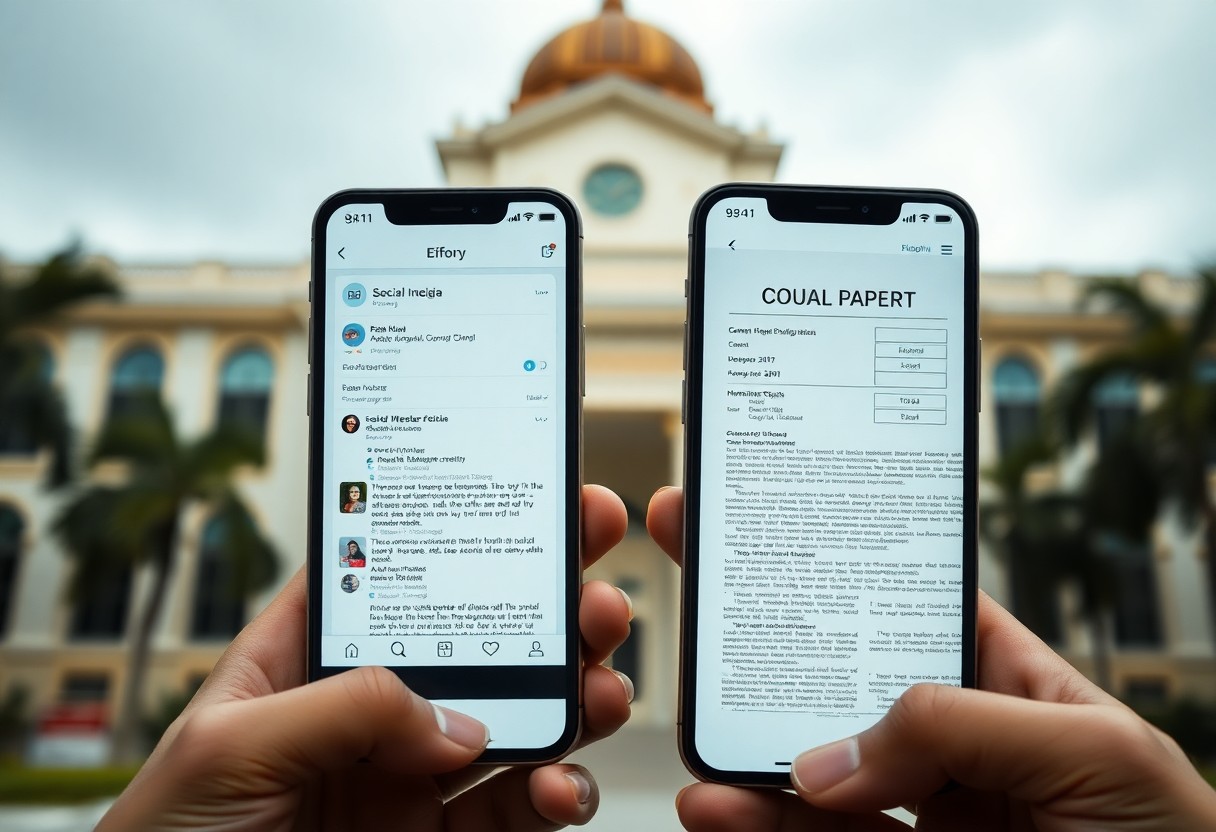Social media plays a significant role in modern divorce proceedings in Malaysia, impacting how your relationship history is perceived. Your posts, messages, and interactions online can serve as evidence in court, potentially influencing the outcome of your case. Understanding how this evidence is interpreted is important, as it may reveal your conduct and intentions during the marriage. Additionally, misuse of social media can adversely affect your claims regarding custody or division of assets, so it’s important to navigate this digital landscape with caution.
Key Takeaways:
- Social media evidence can be used to support claims of infidelity or misconduct in divorce cases.
- Courts assess the authenticity and relevance of social media evidence before considering it in decisions.
- Privacy settings and the ownership of the social media account may affect admissibility of evidence.
- Posts, messages, and photos can serve as documentation of behavior or relationship status.
- Evidence must comply with legal standards for admissibility, including chain of custody.
- Parties may be advised to preserve relevant social media evidence during divorce proceedings.
- Judges have discretion in evaluating the weight of social media evidence in their decisions.

Unpacking Social Media as Digital Evidence
Social media serves as a vital source of digital evidence in divorce proceedings, reflecting personal interactions, behaviors, and sentiments. This medium can provide insight into your relationship dynamics, showcasing behaviors that may support or undermine your claims in court. Judges increasingly recognize these platforms as relevant, making it vital to understand their implications on your divorce case.
The Significance of Social Media in Malaysian Legal Context
In the Malaysian legal landscape, social media holds substantial weight in divorce cases, influencing judgments regarding custody, asset division, and allegations of misconduct. The courts accept social media posts as reliable evidence that can inform decisions, transcending traditional forms of documentation. Thus, your digital footprint can significantly impact the outcome of your case.
Types of Evidence Typically Collected from Social Media
Common evidence extracted from social media platforms includes screenshots of conversations, images, status updates, and location tags. Courts may analyze posts that reveal infidelity, financial status, or parenting capabilities. Evidence such as direct messages can provide context to your claims. Assume that this data can be pivotal in illustrating behavior patterns that influence legal decisions.
| Type of Evidence | Description |
| Screenshots | Visual captures of conversations or posts. |
| Images | Photographs that reveal lifestyle or custody situations. |
| Status Updates | Public posts reflecting emotional or relationship changes. |
| Location Tags | Data indicating your whereabouts during significant events. |
| Direct Messages | Private communications that might hold relevance to the case. |
Each type of evidence plays a distinct role in your divorce proceedings. For instance, screenshots can serve as direct proof of conversations regarding financial matters or infidelity, while images may depict lifestyle changes that affect custody decisions. Understanding these pieces of evidence can directly influence the strategy you adopt during your legal battle. Assume that this knowledge empowers you to navigate your divorce with greater awareness.
- Screenshots of conversations.
- Images depicting lifestyle.
- Status updates reflecting relationship changes.
- Location tags indicating presence during events.
- Direct messages containing relevant discussions.

Legal Framework Governing Social Media Evidence
Understanding the legal framework surrounding social media evidence in divorce cases ensures you are better equipped to navigate proceedings effectively. In Malaysia, electronic evidence, including social media posts, is governed by the Evidence Act 1950 and the Digital Signature Act 1997. These laws establish how digital content can be submitted and evaluated in court, influencing the weight such evidence carries during divorce hearings.
Relevant Malaysian Laws and Regulations
The Evidence Act 1950 is pivotal in determining the admissibility of social media evidence. It allows electronic documents to be recognized provided they meet the criteria of authenticity and relevance. Additionally, the Digital Signature Act 1997 ensures digital communications are verifiable, increasing their potential value in legal contexts, including divorce.
Criteria for Admissibility in Divorce Proceedings
Admissibility of social media evidence hinges on several factors, including relevance, authenticity, and reliability. Courts assess whether the evidence directly relates to the case at hand and if it can be verified as genuinely originating from the party it claims to represent.
To strengthen your case, ensure that the social media content is clearly dated and contextualized. Courts require your evidence to show a legitimate connection to your claims, whether they pertain to infidelity, financial misconduct, or child custody issues. Use screen captures that display timestamps and original posts to bolster the argument that this evidence is not fabricated. Additionally, corroborating evidence might be necessary to demonstrate the implications of the social media content, especially in contested divorce matters where both parties may present conflicting narratives.
Strategic Utilization of Social Media Evidence
Leveraging social media evidence strategically can significantly impact the outcome of your divorce proceedings. By gathering screenshots, posts, or messages that illustrate financial situations or relationship dynamics, you can strengthen your case. For example, evidence of lavish spending on social media can challenge claims of financial distress, while hostile interactions can underline patterns of behavior relevant to custody or settlement decisions.
How Social Media Can Influence Financial Settlements
In divorce negotiations, social media activity can reveal discrepancies in financial claims. For instance, if your spouse is portraying a prosperous lifestyle online while claiming poverty, documenting such evidence can influence settlement discussions. Courts may view social media as a reflection of true financial status, which can ultimately affect the division of assets and spousal support.
The Role of Social Media in Custody Disputes
Social media plays a significant role in custody disputes, providing insight into parenting capabilities and lifestyles. Posts depicting irresponsible behavior or neglect can be used to argue against a parent’s suitability for custody. Virtual interactions might also showcase involvement with children, positively impacting custody evaluations.
Detailed analysis of social media content can reveal patterns in behavior that either support or undermine your custody case. Child welfare is of paramount concern in custody disputes, and potential evidence from social media—such as posts illustrating unhealthy environments or neglectful actions—can sway a court’s decision. In contrast, evidence showcasing your active involvement in parenting—such as photos of outings or events—can enhance your opportunity for favorable custody arrangements. Courts assess these aspects closely, valuing evidence that demonstrates your commitment to the child’s well-being.

Ethical Considerations and Risks
Engaging with social media evidence in divorce proceedings raises numerous ethical issues and risks that you must navigate carefully. These considerations include the potential for invading privacy, the accuracy of information, and the intention behind collecting evidence. As you seek to build your case, understanding the ethical implications can prevent legal missteps that may jeopardize your position.
Privacy Issues: The Fine Line of Evidence Gathering
Collecting social media evidence often treads a delicate line between legitimate investigation and invasion of privacy. You risk violating privacy laws or ethical standards if you access private accounts without consent. Courts may view evidence obtained through questionable means as inadmissible, potentially undermining your case. Always ensure that your methods of gathering evidence comply with legal norms and respect personal boundaries.
Potential Consequences of Misusing Social Media Evidence
Misusing social media evidence can lead to severe repercussions, including legal penalties, loss of credibility, and negative impacts on your case outcome. Courts may dismiss improperly obtained evidence, severely weakening your position in the divorce. Additionally, ethical violations can damage your reputation and trustworthiness, making it difficult to negotiate settlements or custody arrangements.
Misusing social media evidence not only affects the legal outcome but also has the potential to escalate conflict between you and your spouse. For instance, exhibiting unauthenticated screenshots or engaging in harassment through social media can result in counterclaims, leading to increased legal fees and prolonged disputes. Furthermore, such actions could influence custody evaluations, as courts prioritize the best interests of children in a divorce, and any unethical behavior may cast doubt on your parenting capabilities. Ultimately, maintaining integrity in your evidence gathering strategy is necessary for a favorable resolution.
Future Trends: The Evolving Landscape of Digital Evidence
The future of divorce proceedings is increasingly reliant on digital evidence, transforming how courts assess marital discord. As technology advances, the types of evidence you can present will expand, encompassing data from various digital platforms beyond social media, such as messaging apps and cloud storage services. This evolution could significantly alter the case outcomes as courts become more adept at interpreting digital footprints, influencing how both parties strategize.
The Impact of Emerging Technologies on Divorce Cases
Emerging technologies, such as artificial intelligence and blockchain, can refine the collection and verification of digital evidence in divorce cases. AI tools may help in analyzing vast amounts of data to find patterns or inconsistencies in behavior, while blockchain can offer secure, tamper-proof records of digital interactions. As these technologies become standard practice, your ability to present a comprehensive digital narrative may enhance, potentially affecting the court’s decisions on custody and asset division.
Predictions for Social Media’s Role in Legal Matters
As social media continues to evolve, its role in legal matters, particularly in divorce cases, is expected to grow significantly. Future platforms and the increasing integration of multimedia evidence may enhance the insights courts gain into your relationship dynamics. You may find that the rise of ephemeral messaging services will challenge how evidence is retained and accessed, potentially leading to more complex strategies for both presenting and contesting evidence in court.
Social media’s placement in legal matters is projected to shift towards greater scrutiny and adaptation to changing public behaviors. You will likely see courts increasingly relying on posts, interactions, and even digital reputation analysis to inform their decisions. For instance, emotional tones in social media communications can be vital in understanding relationships, thus making them central to cases. Furthermore, as privacy concerns grow, courts might navigate new challenges in balancing evidence admissibility with individual rights. The integration of real-time evidence could also lead to more dynamic court procedures, where decisions are influenced by ongoing digital activities.
Conclusion
The treatment of social media evidence in Malaysian divorce cases highlights the importance of understanding how your online activities can impact legal proceedings. Courts often scrutinize social media content as it may reveal behaviors or intentions relevant to parental rights and asset division. You should ensure that your social media presence aligns with your objectives in a divorce, as posts, messages, or interactions can be presented in court. As you navigate this process, being mindful of what you share online can significantly affect the outcome of your case.
FAQ
Q: How is social media evidence considered in Malaysian divorce cases?
A: Social media evidence can be presented in court to support claims of infidelity, neglect, or other behaviors relevant to divorce proceedings.
Q: What types of social media evidence are admissible in court?
A: Posts, messages, photos, and videos from platforms like Facebook, Instagram, and WhatsApp can be admissible if they are relevant to the case.
Q: How can social media posts be used to establish infidelity?
A: Posts that show interactions with someone outside the marriage, such as flirting or private communications, can indicate infidelity.
Q: Can social media evidence impact custody arrangements?
A: Yes, evidence that suggests inappropriate behavior or a detrimental lifestyle can influence custody decisions during divorce proceedings.
Q: What legal standards apply to social media evidence?
A: The evidence must be authentic, relevant, and not obtained through illegal means to be accepted in court.
Q: Is consent required to use social media evidence in court?
A: While consent isn’t specifically required, obtaining evidence in a manner that respects privacy laws is necessary for it to be usable in court.
Q: Are there risks associated with using social media evidence?
A: Yes, social media evidence can be selectively interpreted, and reliance on it may backfire if the evidence is misrepresented or taken out of context.
